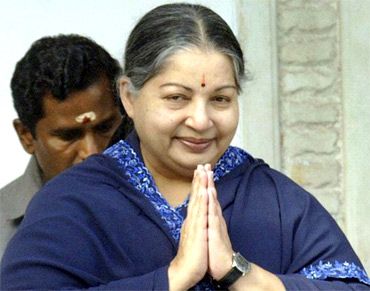 There is virtually no opposition to the All India Anna Dravida Munnetra Kazhagam -- the ruling party in Tamil Nadu, since Karunanidhi's Dravida Munnetra Kazhagam, the main opposition party is fragmented by family dissensions.
There is virtually no opposition to the All India Anna Dravida Munnetra Kazhagam -- the ruling party in Tamil Nadu, since Karunanidhi's Dravida Munnetra Kazhagam, the main opposition party is fragmented by family dissensions.
The Congress leaders are near-invisible in the state – the ADMK has driven out the party from Tamil Nadu
That is why a senior political commentator said that Tamil Nadu Chief Minister Jayalalitha is the modern 'Mahishasur Mardini' who has taken birth to trounce the Congress in Tamil Nadu.
Excerpts from the interview:
What are the projections of ADMK prospects in the Lok Sabha?
The ADMK is bound to sweep the state. My estimate is that Jayalalitha would bag somewhere from 25 to 28 seats, the DMK 5 to 8, and the AIADMK allies such as the Marumalarchi Dravida Munnetra Kazhagam, and the Communist Party of India might take the rest. This means wiping out of the Congress and Vijaykant’s Desiya Murpokku Dravida Kazhagam.
How has the United Progressive Alliance ignored Tamil Nadu?
The UPA leadership failed to attract the ADMK not only from the party-to-party contact, but also from the angle of the Centre and state governments because of their callous attitude towards Jayalalitha.
It is sad that none of the Union ministers discussed the basic issues pertaining to the economic, commercial and public welfare developments of Tamil Nadu. None of these ministers drove to the Tamil Nadu secretariat to meet the chief minister.
The arrogant behaviour of these few ministers has made Jayalalitha and her party to go after the Congress in the state and ‘finish them’.
What are the crucial issues?
Not one, but three -- power shortage, slow infrastructure developments and massive hikes in bus fares and in essential commodities prices.
Corruption of course, is an issue in Tamil Nadu. The Sri Lankan Tamil issue was a temporary balloon floated by one section of the DMK, which was grounded after they parted ways with the UPA.
Why is the DMK fragmented?
The DMK is ridden with family disputes. When I talked to a senior DMK leader and son of Karunanidhi -- he openly confessed that the future of the DMK without his father is bleak. And he agreed that one section (of the party) would surrender to the ADMK.
Politically speaking, a weakened DMK is an asset to Jayalalitha. The AIADMK does not have a single enemy in Tamil Nadu.
And Jayalalitha has comfortable majority in the state assembly –the AIADMK could have bagged five seats out of six. But she let go one seat for the sake of the CPI. And this calculated political gamble had put the DMK in a tight spot. Jayalalitha anticipated that DMK would again try out with the Congress.
In my 10-day visit to Tamil Nadu, I closely interacted with top leaders of the AIADMK, the DMK the DMDK and the PMK, and it gave me an understanding that negative factors of the ruling ADMK are not properly being politically exploited by the DMK, the major opposition party.
The power shortage in the state should have created a public outburst. The DMK failed to take advantage of that. Needless to say, that timely rains saved the ADMK.
Jayalalitha’s calculated moves during the peak summer have been to ensure that the ADMK sympathisers and her voter bank gets "daily doses of incentives".
For example, the Amma Unavagam -- the food subsidisation program is popular for its cheap idlis and snacks. She has realised that such gimmicks pay political dividends to her party.
Exactly a fortnight after the opening of Amma canteen program, Jayalalitha has gone in for providing subsidised vegetables. And on AIADMK legend and late Chief Minister C N Annadurai's birth anniversary, she announced the ‘Amma Mineral Water’ scheme, which aims to make available one liter of mineral water packed in bottles at Rs 10 each
But there the absence of participation and articulation in the assembly is an issue by other political minds in the ADMK. Each and every question asked in the assembly is answered by Jayalalitha herself.
And that way, Jayalalitha resembles Gujarat Chief Minister Narendra Modi who also would not permit others to grow taller in their respective statures. Such may be the regional aspirational trends in 2014 Lok Sabha polls.








